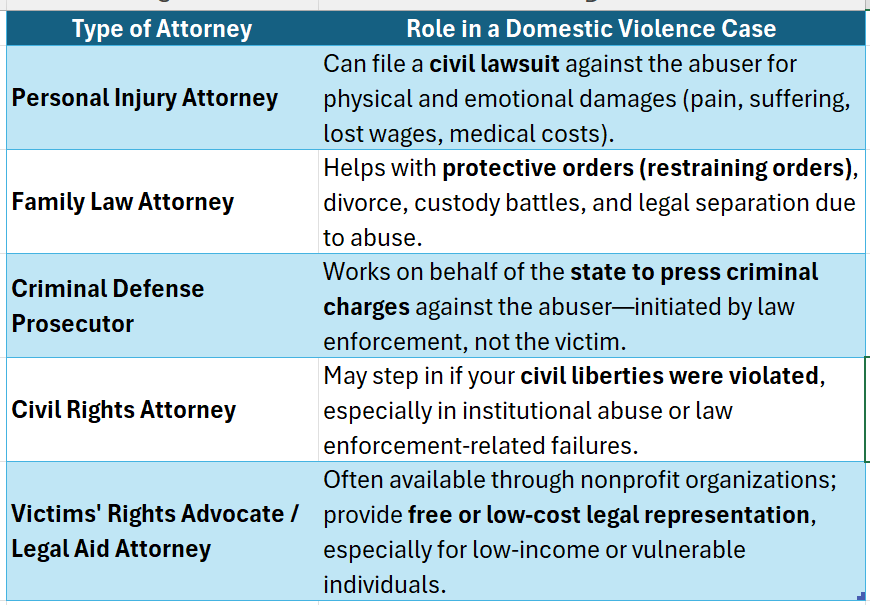How Do You Suing for Domestic Violence? A Compete Guide
Looking for trusted legal experts to handle your case? Whether it’s a complex claim or a personal issue, FreeLegalCaseReview offers free consultations and expert advice tailored to your needs. Or call us directly at 833-248-4565.
Understanding how to Suing For Domestic Violence is crucial for those who have experienced it. It’s not just about physical harm; emotional and psychological abuse also count. Knowing your rights can empower you to take action and seek justice.
What Constitutes Domestic Violence?
Domestic violence can include:
- Physical abuse: Hitting, slapping, or any form of physical harm.
- Emotional abuse: Manipulation, threats, or constant criticism.
- Financial abuse: Controlling access to money or resources.
Recognizing these forms is the first step in understanding if you have a case.
Steps to Take
- Document Everything: Keep records of incidents, including dates and descriptions.
- Seek Help: Contact local shelters or hotlines for support.
- Consult a Lawyer: A slip and fall lawyer can help you understand your legal options, even if they specialize in different areas.
Taking these steps can help you build a strong case and move forward.
The Legal Process: How Do You Sue for Domestic Violence?
Understanding how to sue for domestic violence is crucial for anyone facing this difficult situation. It’s not just about seeking justice; it’s about reclaiming your life and ensuring safety. Knowing the legal process can empower you to take the necessary steps toward healing and protection.
First, gather evidence. This includes photos of injuries, police reports, and any communication with the abuser. Documenting everything is vital. You may also want to consult a slip and fall lawyer who specializes in personal injury cases, as they can provide valuable insights into your situation. Next, file a civil lawsuit. This involves submitting your complaint to the court, outlining your case and the damages you seek. Be prepared for a potentially lengthy process, but remember, you’re taking a stand against abuse. It’s important to have legal support throughout this journey.
Gathering Evidence: What You Need to Build Your Case
When considering how to sue for domestic violence, gathering evidence is crucial. Evidence helps prove your case and shows the impact of the abuse on your life. Without solid proof, it can be challenging to hold the abuser accountable. So, let’s explore what you need to build your case effectively.
Types of Evidence to Collect
- Photographs: Take clear pictures of any injuries or damage to property. Visual proof can be powerful in court.
- Medical Records: If you sought medical help, keep all records. They can show the extent of your injuries and support your claims.
- Witness Statements: If friends or family saw the abuse, ask them to write down what they witnessed. Their accounts can strengthen your case.
Additional Tips
- Keep a Journal: Document every incident of abuse, including dates and details. This can help establish a pattern.
- Contact a Lawyer: A slip and fall lawyer may not specialize in domestic violence, but they can guide you on legal procedures. Finding a lawyer experienced in domestic violence cases is essential for navigating the legal system.
Finding the Right Attorney: Who Can Help You Sue for Domestic Violence?

When it comes to suing for domestic violence, finding the right attorney is crucial. This process can feel overwhelming, but having a knowledgeable lawyer by your side can make a significant difference. They can guide you through the legal maze and help you understand your rights.
Look for Specialization
Not all lawyers are created equal. You want someone who specializes in domestic violence cases. They understand the laws and can build a strong case for you. A slip and fall lawyer, for example, may not have the expertise needed for your situation.
Ask About Experience
When choosing an attorney, ask about their experience with domestic violence cases. Have they won similar cases before? Their track record can give you confidence in their abilities. Remember, you deserve someone who will fight for you.
What Damages Can You Claim in a Domestic Violence Lawsuit?
Understanding how to sue for domestic violence is essential for victims seeking justice. It’s not only about stopping the abuse but also about holding the abuser accountable and recovering damages for the harm inflicted. Knowing what damages you can claim empowers you to take significant steps toward healing.
When pursuing a domestic violence lawsuit, you can claim various types of damages, including:
- Medical Expenses: Costs for hospital visits, therapy, and ongoing treatment related to the abuse.
- Lost Wages: Compensation for earnings lost due to injuries or legal proceedings.
- Emotional Distress: Damages for anxiety, depression, and other psychological impacts of the abuse.
- Punitive Damages: These are intended to punish the abuser and deter future misconduct. If you’re uncertain about the legal process, consulting a slip and fall lawyer can provide clarity.
They can help you navigate your options, ensuring you understand your rights and the potential outcomes of your case.
The Role of Restraining Orders in Your Case: Do You Need One?
Understanding the role of restraining orders is essential when suing for domestic violence. These legal tools provide immediate protection and demonstrate to the court that you prioritize your safety.
What is a Restraining Order?
A restraining order is a legal document that prevents an abuser from contacting or approaching you, acting as a protective shield during the legal process.
Benefits of Obtaining a Restraining Order:
- Immediate Protection: Keeps the abuser away.
- Legal Documentation: Serves as evidence of abuse.
- Strengthens Your Case: Shows the court you took action.
- Peace of Mind: Helps you feel safer during a stressful time.
In summary, a restraining order is a powerful ally when suing for domestic violence. It not only ensures your safety but also strengthens your case. Consulting with a slip and fall lawyer or a domestic violence attorney can help you navigate this process effectively.
Ready to connect with top legal professionals? Get immediate support— Call us at 833-248-4565.
Navigating the Court System: What to Expect During Your Lawsuit
Suing for domestic violence is a vital step toward reclaiming your life and seeking justice. Navigating the court system can feel daunting, but understanding the process empowers you to take action and protect yourself.
Understanding the Process
To sue for domestic violence, you begin by filing a complaint in court, detailing your case and the harm suffered. Gathering evidence, such as photos and witness statements, is crucial to support your claims.
Key Steps to Follow
- Consult a Lawyer: Seek a lawyer specializing in domestic violence cases to guide you.
- Gather Evidence: Collect proof of abuse, including medical records and police reports.
- File Your Case: Submit your complaint and pay any necessary fees.
- Attend Hearings: Be ready for court appearances to present your case.
Additionally, if you experience injuries related to domestic violence, a slip and fall lawyer can provide essential support. Taking legal action is courageous, and knowing what to expect can ease the journey. Stay strong and seek the help you need to navigate this challenging process.
Read Also: How to Find a Slip and Fall Lawyer Near You?
How Can FreeLegalCaseReview Support You in Your Legal Journey?
When it comes to domestic violence, understanding your legal options is crucial. Many victims feel overwhelmed and unsure about how to take action. Suing for domestic violence can be a vital step towards healing and justice. At FreeLegalCaseReview, we are here to guide you through this challenging journey with compassion and expertise.
Understanding Your Rights
- We provide clear information on your rights as a victim.
- Our team can help you navigate the legal system, ensuring you know what to expect.
- We can assist in gathering evidence to strengthen your case.
Legal Representation
- Our experienced attorneys specialize in domestic violence cases.
- We can represent you in court, fighting for the justice you deserve.
- If needed, we can also connect you with a slip and fall lawyer for any related personal injury claims.
With our support, you can feel empowered to take the necessary steps towards a safer future. Remember, you are not alone in this fight.
After the Lawsuit: What Happens Next and How to Move Forward?
After you’ve taken the brave step to sue for domestic violence, you might wonder what happens next. Understanding this process is crucial, as it helps you prepare for the journey ahead. It’s not just about the lawsuit; it’s about healing and moving forward with your life.
The Legal Process Unfolds
Once you file your lawsuit, the court will schedule hearings. You may need to provide evidence, like photos or witness statements. This can feel overwhelming, but remember, you’re not alone. Support from friends, family, or even a slip and fall lawyer can help you navigate this tough time.
Moving Forward
After the lawsuit, regardless of the outcome, focus on your healing. Consider counseling or support groups to help you process your experiences. Surround yourself with positive influences and engage in activities that bring you joy. Remember, this journey is about reclaiming your life and finding peace.
Don’t wait to secure the legal representation you deserve. Visit FreeLegalCaseReview today for free quotes and tailored guidance, or call 833-248-4565 for immediate assistance.
You can also visit LegalCaseReview to find the best Lawyer.
FAQs
1. Can I sue someone for domestic violence?
Yes, you can file a civil lawsuit against an abuser to seek financial compensation for physical, emotional, and psychological harm, even if they are also facing criminal charges.
2. What damages can I recover in a domestic violence lawsuit?
You may be able to recover damages for medical bills, lost wages, pain and suffering, emotional distress, therapy costs, and in some cases, punitive damages.
3. Do I need a criminal conviction to file a civil lawsuit?
No, a criminal conviction is not required. Civil cases have a lower burden of proof (“preponderance of the evidence”) compared to criminal cases (“beyond a reasonable doubt”).
4. How long do I have to sue for domestic violence?
Each state has a statute of limitations, which varies. It can range from 1 to 10 years, depending on the state and the specific claims. Some states may extend deadlines for victims of abuse.
5. Can I sue for emotional abuse or psychological trauma?
Yes, in many cases you can sue for intentional infliction of emotional distress, even if there was no physical violence.
6. Will I need to face my abuser in court?
Possibly, but many cases settle out of court. Your attorney can often appear on your behalf or request protective measures during proceedings.




